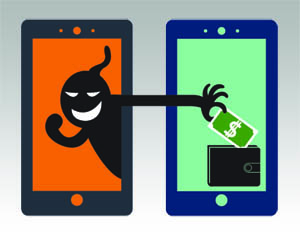The people who read our site are a pretty savvy lot. You know not to accept checks from distant princes. You can spot a phisher from a mile away.
But here’s one that might be new for you: scammers are apparently trying to exploit your “missed call” screen, now.
The scam, simplified: They call you, but immediately hang up. You see a missed call. You call back. They charge you for the call, and for each minute they can keep you on the line.
According to the BBB, this so-called “One Ring” scam is on the rise.
Like many a ruse, this one relies on hitting many, many potential targets at once. The scammer sets up a computer to call thousands of numbers per hour — because for every 99 people who follow their gut and don’t call weird numbers, there’s 1 person who will. Maybe they’re waiting for response on a job interview, and don’t know what number it’ll come from. Maybe they’re hoping it’s that girl from the bar last night. Maybe the number just looks kind of familiar. It’s all about making mass sweeps and finding the exceptions.
The trick? They only let the call ring once before it automatically hangs up. One ring is enough for the number to show up on your missed call screen, but just short enough that you’re not likely to answer it in time (which keeps the call from fully connecting and thus keeps the scammer from having to front for any long distance fees.)
Speaking of long distance fees: the number it’s dialing from is, generally, one from outside of the US — but one that has the same country code (+1, which we share with Canada and almost all of the Caribbean nations, from the Bahamas to Jamaica), and thus looks a whole lot like a US number. On US premium numbers, the FTC requires the caller to explicitly agree to charges. On international numbers, the FTC has no jurisdiction.
We’ve seen tricks like this before, using many of the same basic concepts —the sneaky international number, the hook to get you to call it back. A few years ago, a common scam technique was to text someone saying “Your [relative here] is hurt, and you are the emergency contact! Call [sneaky international number here] for more information.”
But this is the first time I’ve seen them boil it down to a simple missed call. It plays on the ubiquity of smartphones, and that… no one really calls each other anymore. If someone is calling, it’s probably important, right? Better call’em back!
While reports on scams like this tend to warn you that you’ll be charged a zillion dollars per second, that’s… usually not the case, in reality. Carriers will often void the charges if they/you catch them, so the scammer’s goal is often to keep anyone from noticing the charge. They’ll charge you a few bucks to establish the call, then a few bucks for each minute they keep you on hold/on the line.
But even if they charge you nothing, there are other reasons not to call’em back:
- Once you’ve called back, they know there’s a human on the other end of that number. It’s like hitting “unsubscribe” on a mass email — if the sender is a good guy, you’re unsubscribed. If they’re a spammer, you’ve just verified that its a legit inbox and have been signed up for a million more mailing lists.
- Once a scammer has a caller on the line, it’s an opportunity to phish. If a person is open to dialing a mystery number, why not see if they’ll believe you work for their bank and need their credentials?
How To Avoid Gettin’ Scammed:
- If you don’t recognize a number, don’t call’em back.
- If you really want to call back, Google the number first. Check the area code to make sure it’s not long-distance. Check the full number, too; in many cases, you’ll find a page full of results saying “Do not call! It’s a scam!”
- If you’re an Android fan, try to get on a device running Android 4.4 (KitKat). It has a built-in number identification system, and it works quite well for at least identifying legitimate, non-scammy phone numbers as safe to call.
- Check your phone bill for sketchy charges. Your carrier knows aaaall about scams like this, and will generally reverse the charge if you complain.
tl;dr: stranger danger.
[image credit: jesadaphorn on Shutterstock]
